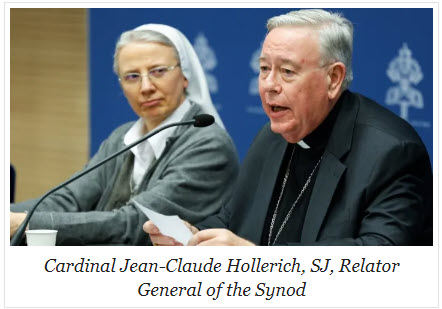 The Vatican declaration, Fiducia Supplicans, that permitted blessing same-gender relationships has been at the center of Catholic LGBTQ+ discourse for many weeks.
The Vatican declaration, Fiducia Supplicans, that permitted blessing same-gender relationships has been at the center of Catholic LGBTQ+ discourse for many weeks.
In April, Dignitas Infinita was released with its condemnatory approach to gender identity issues and unleashed a brand new wave of commentaries/debates.
The conversation around Fiducia Supplicans continues, though.
Synod Leaders Say Blessings No Longer a Synod Issue
Two cardinals leading the church’s synodal efforts spoke about Fiducia Supplicans this spring. While affirming the declaration, both said the issue of blessing same-gender couples was not an issue for the upcoming Synod on Synodality General Assembly this October.
Cardinal Jean-Claude Hollerich, SJ, of Luxembourg, the Synod’s Relator General, commented on Fiducia Supplicans during a press conference about the synodal working groups announced in March. While describing the declaration as “very beautiful,” the cardinal affirmed it as showing “God loves everyone, including those in irregular situations.” Hollerich explained further that, “It’s truly a pastoral document, it is not a doctrinal document.” He added that, with its release, the issue of blessings would not need to be taken up at this October’s assembly because Pope Francis “has already decided, and it is not something we should go back to, at least in the Synod.”
Malta’s Cardinal Mario Grech, Secretary General of the Synod, said he had no advanced notice about the declaration and became aware of it “like everybody else when it was published.” Grech was not upset with this course of events because, according to him, Fiducia Supplicans has “nothing to do with” the Synod on Synodality’s assemblies. Speaking at a conference in Ireland, the cardinal remarked on last year’s synod assembly, saying a reference to “LGBTQ” was removed from the synthesis report because:
“We noticed that some had difficulty with that phrase and changed it. We did not change the content but the wording and in that way, we managed to get a majority vote. Whereas had we left the phrase I’m sure it would not have got the vote it got. We need to take into account the needs and the sensibilities of all because our task is to try to reach a consensus and learn, as a church, how to arrive at something agreed by the wider spectrum.”
[Reported on May 7, 2024 by Robert Shine, Managing Editor at New Ways Ministry]
![]()


/cdn.vox-cdn.com/uploads/chorus_asset/file/15786728/facebook-video.0.1462601647.jpg)